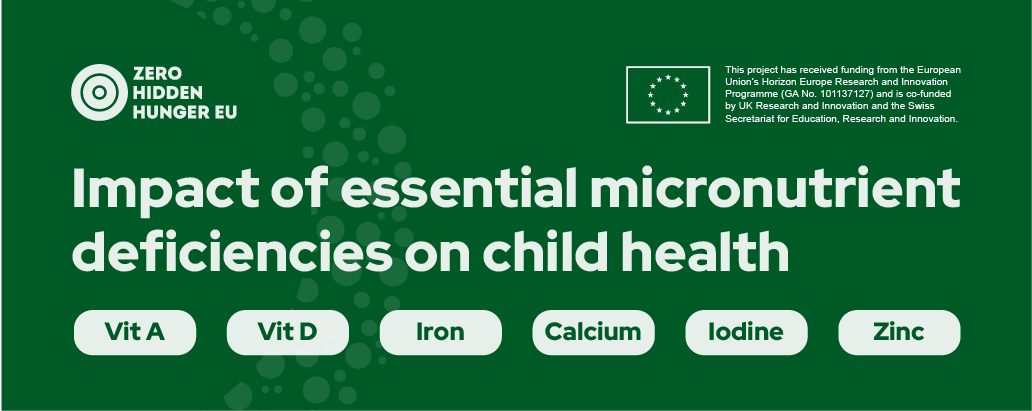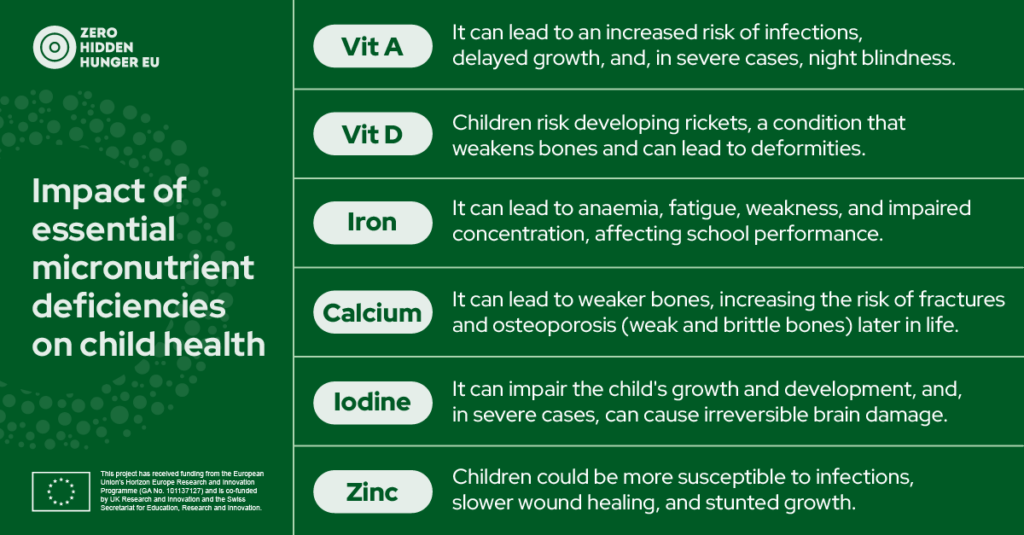
Imagine a child who seems healthy but struggles to focus at school and is often tired. The cause is not obvious, but it could be hidden hunger – a type of malnutrition where individuals are deficient in micronutrients (also known as vitamins and minerals). Hidden hunger is not always visible, yet it has long-term effects on growth, brain development, and overall well-being. Despite living in an era of advanced healthcare and abundant food, many children across Europe (and beyond) aren’t getting the vitamins and minerals they need to thrive.
Why micronutrient deficiencies matter
Children’s growing bodies and developing brains rely on a steady intake of vitamins and minerals. These micronutrients support everything from cognitive and immune function to bone formation and energy production. Children are at greater risk of micronutrient deficiencies due to their higher demand for nutrients relative to energy intake. Some key vitamins and minerals that require extra attention to during childhood include vitamin A, vitamin D, iron, calcium, iodine, and zinc.
Key micronutrient deficiencies and their effects
- Vitamin A deficiency: crucial for vision, immune function, and cell growth. A deficiency can lead to an increased risk of infections, delayed growth, and, in severe cases, night blindness.
- Vitamin D deficiency: essential for calcium absorption and bone strength throughout life. Without enough, children risk developing rickets, a condition that weakens bones and can lead to deformities, but also increased risk of osteoporosis in later years. Given that vitamin D is mainly produced through sunlight exposure, children who spend less time outdoors or live in regions with limited sunlight are particularly at risk.
- Iron deficiency: crucial for haemoglobin production and, oxygen transport in the blood. A lack of iron can lead to anaemia, fatigue, weakness, and impaired concentration, affecting school performance.
- Calcium deficiency: vital for building strong bones and teeth. A low intake can lead to weaker bones, increasing the risk of fractures and osteoporosis (weak and brittle bones) later in life. Calcium and vitamin D are needed in concert.
- Iodine deficiency: important for thyroid function and brain development. A deficiency can impair growth and development, and, in severe cases, can cause irreversible brain damage.
- Zinc deficiency: plays a critical role in immune function and growth. Children with low intake are more susceptible to infections, slower wound healing, and stunted growth.
Causes of micronutrient deficiencies
There are several reasons why children may not get enough essential vitamins and minerals. Poor dietary quality, including a reliance on nutrient-poor but energy-rich foods, and poor dietary diversity are some of the major reasons that can lead to nutritional gaps. Families with economic constraints leading to a struggle to afford a balanced diet rich in fruits, vegetables, and other nutrient-rich foods are also at higher risk. Additionally, children with restrictive diets due to allergies, food preferences, or medical conditions may struggle to meet their micronutrient needs.


Author: Laura Bosman
Laura is a junior content manager at EUFIC. She obtained a BSc and MSc in Nutrition and Health, specialising in nutritional and public health epidemiology, at Wageningen University and also has a minor in public health from the University of Eastern Finland to strengthen her foundation for understanding public health and related research, issues of global health, and health promotion. At EUFIC, she works on translating complex scientific findings into information (e.g., social media content, written website articles, newsletters) that people can make sense and use of, addressing the global challenges regarding our food choices, our health, and environmental sustainability.
